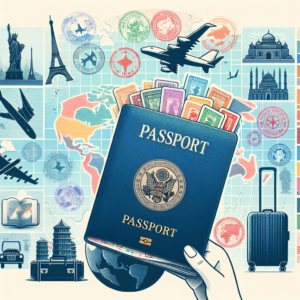Unveiling the Crisis: The Urgent Need for Immigrant Rights Protections
[caption id="attachment_37184" align="alignnone" width="601"] Visa Travel[/caption]
In recent years, the conversation surrounding immigrant rights has intensified, revealing a complex web of challenges that immigrants face in their pursuit of safety, opportunity, and dignity. As global migration patterns shift and political climates fluctuate, the urgent need for comprehensive protections for immigrant populations has become increasingly apparent. This article aims to explore the current landscape of immigrant rights, the historical context of advocacy movements, the key challenges faced by immigrants, the role of policy, grassroots activism, and recommendations for strengthening protections.
Understanding the Current Landscape of Immigrant Rights in Today’s Society
The current landscape of immigrant rights is marked by a dichotomy of progress and regression. While some regions have made strides in enacting inclusive policies, others have seen a rise in anti-immigrant sentiment and legislation. The COVID-19 pandemic further exacerbated existing vulnerabilities, as many immigrants found themselves on the front lines of essential work yet excluded from critical support systems. The rise of xenophobia, fueled by misinformation and political rhetoric, has led to increased discrimination and violence against immigrant communities. As a result, the need for robust protections and a reevaluation of societal attitudes toward immigrants has never been more urgent.
The Historical Context: A Brief Overview of Immigrant Rights Movements
The struggle for immigrant rights is deeply rooted in a history of activism that spans decades. From the labor movements of the early 20th century to the civil rights era, immigrants have consistently fought for recognition and equality. Landmark events, such as the 1986 Immigration Reform and Control Act, aimed to address the status of undocumented immigrants but often fell short of providing lasting solutions. More recently, movements like the Dreamers' campaign have highlighted the plight of young immigrants, advocating for pathways to citizenship and protection from deportation. This historical context underscores the resilience of immigrant communities and the ongoing need for advocacy in the face of systemic challenges.
Key Challenges Faced by Immigrants: Legal, Social, and Economic Barriers
Immigrants today encounter a myriad of challenges that hinder their ability to thrive. Legally, many face an intricate and often hostile immigration system that can lead to prolonged detention, deportation, and family separation. Socially, immigrants frequently experience discrimination, isolation, and stigmatization, which can exacerbate mental health issues and hinder community integration. Economically, barriers such as limited access to jobs, education, and healthcare create a cycle of poverty that is difficult to escape. These challenges are compounded for undocumented immigrants, who often live in fear of being discovered and deported, further marginalizing them from society.
The Role of Policy: Analyzing Current Legislation Affecting Immigrant Rights
Current legislation plays a pivotal role in shaping the rights and protections afforded to immigrants. Recent policies, such as the Deferred Action for Childhood Arrivals (DACA) program, have provided temporary relief for some, yet the lack of a permanent solution leaves many in a state of uncertainty. Conversely, policies aimed at increasing border security and deportation have created an environment of fear and instability. The patchwork nature of immigration laws across states further complicates the situation, as some states enact progressive measures while others impose restrictive policies. A comprehensive review and reform of immigration legislation are essential to ensure that the rights of all immigrants are upheld.
Advocacy and Activism: Grassroots Efforts for Change and Protection
Grassroots activism has emerged as a powerful force in the fight for immigrant rights, mobilizing communities and raising awareness about the challenges faced by immigrants. Organizations such as the American Civil Liberties Union (ACLU) and United We Dream have been at the forefront of advocacy efforts, providing legal assistance, resources, and support to those in need. Local community groups have also played a crucial role in organizing protests, educational campaigns, and outreach programs to empower immigrants and foster solidarity. These grassroots efforts not only highlight the urgent need for change but also serve to humanize the immigrant experience, challenging the narratives that perpetuate discrimination and fear.
The Path Forward: Recommendations for Strengthening Immigrant Rights Protections
To effectively address the crisis of immigrant rights, a multifaceted approach is necessary. First, comprehensive immigration reform must be prioritized, creating pathways to citizenship for undocumented immigrants and ensuring protections for vulnerable populations. Second, policymakers should focus on dismantling systemic barriers that perpetuate discrimination and inequality, including access to education, healthcare, and employment opportunities. Third, increased funding for legal aid and support services is essential to assist immigrants in navigating the complex immigration system. Finally, fostering a culture of inclusivity and understanding through public education campaigns can help combat xenophobia and promote acceptance within society.
The urgent need for immigrant rights protections is a pressing issue that demands immediate attention and action. As we navigate the complexities of a rapidly changing world, it is imperative that we recognize the contributions of immigrants and work collectively to ensure their rights are upheld. By understanding the current landscape, acknowledging historical struggles, addressing key challenges, analyzing policy impacts, supporting grassroots activism, and implementing comprehensive reforms, we can pave the way for a more just and equitable society for all. The time for change is now, and it is our collective responsibility to advocate for the rights and dignity of every individual, regardless of their immigration status.
